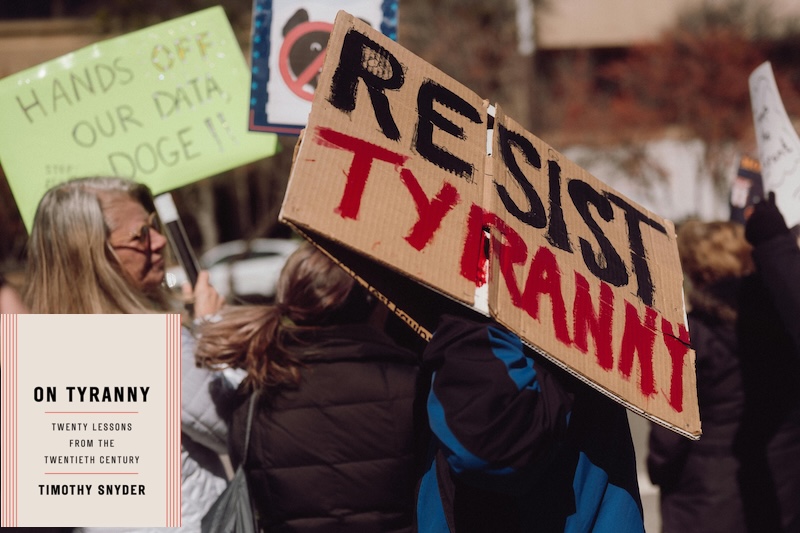If you missed the first posts of this series, you'll find them here:
Holding the Line: The Role of Professional Ethics
Timothy Snyder reminds us that professionals play a critical role in resisting tyranny. Lawyers, doctors, journalists, engineers—these are the people who keep systems running and, ideally, keep them honest. But when professionals cave under pressure, institutions lose their integrity, and corruption spreads like a bad case of malware.
So how can we use technology to help professionals stay ethical, even when the heat is on? Turns out, quite a bit.
The Power of Collective Action
This lesson is a little different from the previous ones because it’s less about individual action and more about coordination. It’s about spreading awareness, supporting ethical tools, and standing together to keep professional standards intact. When people in key roles hold their ground, it makes it a lot harder for authoritarian forces to take over.
Here are a few ways technology can help professionals keep their ethical backbone strong.
Nobody likes a snitch—except when they’re exposing corruption. Having a secure way to report ethical violations is essential. Platforms like EthiControl provide encrypted, anonymous whistleblowing channels that allow professionals to speak up without risking their careers.
What you can do:
- Encourage your organization to adopt a secure whistleblowing system.
- If you’re tech-savvy, contribute to open-source whistleblowing tools to make sure they stay available.
Why it matters:
History shows that whistleblowers are often the first line of defense against institutional corruption. The more barriers we remove for reporting ethical violations, the better.
2. Ethics Training Simulations
Ever wish you could practice standing up to unethical pressure without actually risking your job? Interactive simulations may let professionals do just that. These tools help people rehearse ethical decision-making so that when the real pressure comes, they don’t freeze up. (Side note: this series is about using technology, but role play is a great first
step for ethics training. People will find their ethics tested -- it's not if, but when -- so practice will help a lot.)
What you can do:
- Support and promote ethics training programs in your industry.
- If you work in tech, look into developing simulations for ethical training.
Why it matters:
When people are put on the spot, they often default to whatever feels easiest. But if they’ve already practiced saying “no” to unethical orders, they’re far more likely to do it when it counts.
3. Cross-Border Ethics Communities
Sometimes, the best support comes from outside your immediate environment. When local institutions fail, professionals can connect across borders to uphold ethical standards. Secure, encrypted messaging platforms and anonymous forums allow for safe discussions about ethical challenges.
What you can do:
- Join or support international professional ethics groups.
- Contribute to platforms that provide secure, anonymous spaces for professionals under pressure.
Why it matters:
During times of political crackdowns, journalists, scientists, and doctors have relied on international networks to keep working ethically. Having those networks in place before things get bad makes all the difference.
4. Tamper-Proof Ethics Archives
One of the oldest tricks in the authoritarian playbook is rewriting history. If professional standards start eroding, having a reliable record of past ethical guidelines can serve as a reality check.
What you can do:
- Support blockchain-based or other tamper-resistant documentation efforts.
- Use and promote decentralized record-keeping systems that preserve professional ethics standards.
Why it matters:
If history can be rewritten, people can be convinced that ethical backsliding is just “how things have always been.” Having clear, immutable records helps resist that gaslighting.
It's also important to remember the people who had courage. We've already seen plenty of examples of that. Here's
a quick example of people who stood up for ethics (and who didn't):
Before charges against New York City Mayor Eric Adams were dropped, at least seven high-ranking prosecutors resigned in protest over the Justice Department's directive to dismiss the case. These included the acting U.S. attorney for the Southern District of New York, Danielle Sassoon, and several top officials in Washington, D.C., such as John Keller and Kevin Driscoll.
The charges were eventually dropped by two prosecutors who filed a motion to dismiss the case "without prejudice," meaning the charges could be reinstated later. This decision was made under the supervision of Acting Deputy Attorney General Emil Bove, who had ordered the dismissal of the charges.
5. Alternative Credential Systems
When authoritarian governments take over, they often go after professional licensing boards first—making sure that only the “right” people get to practice law, medicine, journalism, or even coding. Decentralized credentialing systems can help professionals prove their qualifications even if official channels are compromised.
What you can do:
- Support decentralized credential initiatives like blockchain-based diplomas.
- Advocate for professional organizations to explore independent verification systems.
Why it matters:
When licensing becomes a political tool, ethical professionals can be locked out of their fields. Alternative credentialing helps them keep working, even in hostile environments.
What Can You Do?
Unlike tweaking a browser setting, these steps require group effort—but that doesn’t mean they’re out of reach. Here’s how you can help:
- Spread the word. Share information about these technologies with colleagues and professional networks.
- Support ethical tech. Donate, contribute, or at least stay informed about projects that help professionals stand their ground.
- Push for adoption. Encourage your workplace or industry groups to consider implementing these technologies.
- Learn the tools. The time to get familiar with secure communication or ethics archiving isn’t when a crisis hits—it’s now.
- Build connections. Engage with communities that support professional ethics, both locally and globally.
Professional integrity doesn’t erode overnight—it happens little by little. But the good news is, resistance works the same way. By reinforcing ethical structures now, we make it harder for them to collapse later. And in a world where professionals hold the line, tyranny has a much tougher time taking root.
What do you think? Have you seen other ways technology can help professionals stand up for ethics? Let me know (my contact info is in the about page) I’d love to hear your thoughts.





Use the share icon here if you liked it.
Thanks!